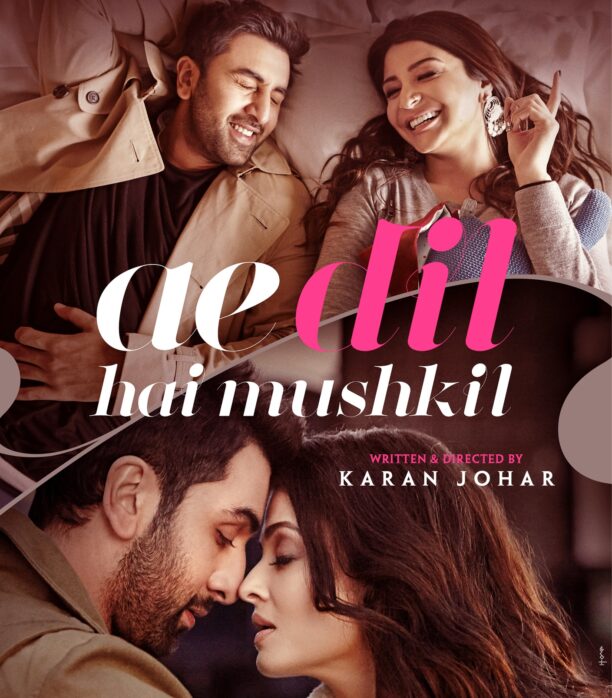 Karan Johar’s most personal film Ae Dil Hai Muskhil, a requiem to unrequited love, is nine years old. It is the film from his own repertoire that Karan Johar loves the most. Ae Dil Hai Muskhil is an exceedingly PURE take on love, of the unreciprocated kind.
Karan Johar’s most personal film Ae Dil Hai Muskhil, a requiem to unrequited love, is nine years old. It is the film from his own repertoire that Karan Johar loves the most. Ae Dil Hai Muskhil is an exceedingly PURE take on love, of the unreciprocated kind.
Ranbir’s Ayaan loves Anushka’s Alize. They have a lot of fun together and are constantly exploring the wild juvenile side to their personality. But she finds him to be just friendship material Though there are four pivotal characters in Johar’s capricious quadrangle, the focus is entirely on Ranbir and Anushka. She finds him fun but no spouse material.
Karan Johar based the Ranbir-Anushka relationship on an intense one-sided relationship he had, which he never got over.
Although Fawad Khan had only ten minutes of playing time he was the central attraction of Karan Johar’s directorial vision in Ae Dil Hai Muskhil . Fawad was all set to do a full-fledged role opposite Katrina Kaif in a entitled Sufi to be directed by debutant director Aditya Dhar and produced by Karan Johar.
But fate and politics willed otherwise.
Dhar had originally planned the film in 2011 with Chitrangda Singh and Prateik Babbar. But things didn’t work out back then. Katrina has been unable to feature in any Dharma Production except for her sizzling dance number ‘Chikni Chameli’ in Agneepath. She was supposed to star with John Abraham and Abhishek Bachchan in Dostana 2. It never got made.
For those who think Ranbir Kapoor has scaled the acme of his performing abilities in Animal, I suggest a revisit to his 2016 hit Ae Dil Hai Muskhil. This was the year of many notable films including Dangal, Sultan, Pink, and Neerja.
Ae Dil Hai Muskhil got kind of submerged in the ocean of excellence. Seeing the film again, on the big screen, I realize how unfair we all were to Ae Dil Hai Muskhil. Why? Because we refuse to acknowledge Karan Johar among the finest contemporary filmmakers of Indian cinema. His cinema exudes an elitist effervescent and that allegedly exempts him from understanding how grief and suffering affects his characters.
In ADHM Karan crosses the powder-puff image effortlessly. The film is gorgeous to look at ; the protagonists are insanely camera-friendly. But the weightlessness of the surface is easy negotiable for us the audience.
Ae Dil Hai Muskhil (ADHM) is one helluva good-looking film with actors who epitomize human beauty. They strive helplessly towards reaching the inner core of their being to obtain a spiritual centre to match that abundance of physical beauty. It is a futile fight. The inner core clashes with the décor, and the latter always wins.
The experience of viewing ADHM is enormously gratifying for the high level of visual aesthetics that Karan invests into his frames. Full marks to cinematographer Anil Mehta for shooting Karan’s location and actors with an intensity that never challenges the characters’ elitist lifestyle.
Just because Ayan (Ranbir Kapoor) moves around in a private plane, it doesn’t mean he is buffered against inclement weather. Love hits him the minute he meets the ebullient Alizeh. Originally she was a girl from Lahore. But after the cross-border tensions between the two countries hit celluloid, Alizeh became a Lucknow girl.
Providentially this geopolitical compromise doesn’t affect the narrative’s high-end emotional velocity. This is a work that caresses greatness, and embraces the theme of unrequited love with a benevolence and grace that sit easily on the plot. Every time Ranbir’s Ayan looks at Anushka’s Alizeh, we see his lifelong adoration for a feisty woman who loves Ayan, but not in “that” way.
And he would have it no other way.
Ayan chases her all the way to death with an obsessive passion. I have not seen a better projection of the hurt anguish and rage of unrequited love in any performance. The tragedy of losing a love you never had is unfathomable. Ranbir jumps deep into ocean of desolation, soaking in that feeling of your love not being incumbent on any person’s approval.
These characters are capable of deep-end breathing. Karan Johar keeps them afloat on the surface of a very blue, very tranquil, very scenic ocean. The scenic never overpowers the cynic in Karan Johar’s cinema. He loves the good things in life and dislikes the thought of the makeup being washed by tears of desolation. Consequently we see the characters in ADHM not as individuals but an amalgamation of the surface beauty that Johar accumulates in his vision and suffuses on the screen in the hope that the audience finds a centre to the placid conflicts.
We do. We find the centre in Ranbir’s unparalleled portrayal of hurt. As he watches Alize being taken away from under his nose by the love of her life (Fawad Khan, bringing a vigorous charm to his underwritten character) , Ayan is so swallowed by despair, it seems his heart will never repair.
But you know how it is with the heart… Karan Johar knows.









